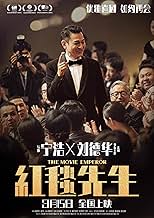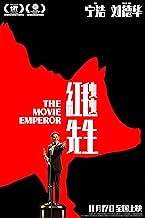Ajouter une intrigue dans votre langueActor Lau Wai-Chi has a huge following of devoted followers and is always keeping an eye on his rivals. After accepting to play the lead in a modest indie drama, Lau begins the laborious pro... Tout lireActor Lau Wai-Chi has a huge following of devoted followers and is always keeping an eye on his rivals. After accepting to play the lead in a modest indie drama, Lau begins the laborious process of mastering the acting skills for the role.Actor Lau Wai-Chi has a huge following of devoted followers and is always keeping an eye on his rivals. After accepting to play the lead in a modest indie drama, Lau begins the laborious process of mastering the acting skills for the role.
- Récompenses
- 1 victoire et 6 nominations au total
Avis à la une
I respectfully agree with the other reviewer who gave it 3 stars, but I chose to gave a 5 for some (but very few) highlights/funny bits in this movie. I understand that Ning was trying to be innovative and creating something new however this is not a fun or compelling story at all. The whole script is boring and dreadful and we very much indeed agree that we couldn't wait for this movie to end. Ning is one of my favorite director but this is just not a good piece of him.
My partner said it's a total waste of time and it feels like Ning merged lots of different story lines into one movie however he can't even tell one story right and just didn't finish any of them properly.
Andy Lau is great actor, as always, although this character isn't too difficult for him to play I guess.
My partner said it's a total waste of time and it feels like Ning merged lots of different story lines into one movie however he can't even tell one story right and just didn't finish any of them properly.
Andy Lau is great actor, as always, although this character isn't too difficult for him to play I guess.
10YARDCG
A wickedly funny and very meta portrayal of the modern HK film industry. I deeply appreciate it when films try to be detailed and have their own voice and a sense of place - and this one is VERY deeply positioned in the present moment, many elements of which wouldn't have made sense even 5 years ago.
After all, it is the kind of film which has the main characters practically pray the director of Parasite will find something else to do when they discuss their own film's chances at the international film festivals. The kind of film where the leads get confused for health inspectors when surreptitiously showing up on an unsanitary pig farm uninvited - with everything about the scene evoking what we have learned about the wet markets since 2020. They are there because they want to be inspired to properly depict "rural grit" - which is rightly called out by the local official as an indulgence in poverty porn, their disappointment that the countryside around HK refused to stand in place in "pristine" deprivation nothing but perverse.
Meanwhile, their film's chief sponsor is a vaporware electric car company led by a supremely arrogant techbro - again, something that would have been difficult to imagine even in mid-2010s, yet now a reality both in the U. S. (brand names such as Nicola and Faraday have truly notorious tales to tell) and moreso in the PRC, which invested deeply and profusely into the sector. The protagonist is occasionally interrupted by his smart watch telling him to get up and start moving, since "Movement is life". Last but not least, multiple conversations are held while TV screens display footage from the Ukraine War in the background.
And as a story, this tale of an actor truly in love with his craft and looking to secure his legacy, yet also struggling against his arrogance and other character flaws is very, very thorny and ambiguous. The main character is often in the wrong, yet even his good intentions can backfire - and sometimes vice versa, while the outsiders cannot really tell the difference. The dramatic parallel between their historical film's script and the events outside it may be a little too cute at times in terms of ignored epiphanies, but then again, that is generally the purpose of such (consider the pirate comic in Watchmen.)
Here, Andy Lau may not be LITERALLY playing himself in the script, but he does compete against the literal Jackie Chan (even as it had become an "I don't think about you at all" situation for Jackie.) And the leitmotif here is taken from "In the Mood for Love", Lau's best-known work, ironically recalling the past glory he is struggling to reach again.
I don't know if I can keep going any further without crossing into the spoiler territory. Suffice it to say - there is a reason why, in a year where I saw some 70 films, this was one of my handful of perfect scores.
After all, it is the kind of film which has the main characters practically pray the director of Parasite will find something else to do when they discuss their own film's chances at the international film festivals. The kind of film where the leads get confused for health inspectors when surreptitiously showing up on an unsanitary pig farm uninvited - with everything about the scene evoking what we have learned about the wet markets since 2020. They are there because they want to be inspired to properly depict "rural grit" - which is rightly called out by the local official as an indulgence in poverty porn, their disappointment that the countryside around HK refused to stand in place in "pristine" deprivation nothing but perverse.
Meanwhile, their film's chief sponsor is a vaporware electric car company led by a supremely arrogant techbro - again, something that would have been difficult to imagine even in mid-2010s, yet now a reality both in the U. S. (brand names such as Nicola and Faraday have truly notorious tales to tell) and moreso in the PRC, which invested deeply and profusely into the sector. The protagonist is occasionally interrupted by his smart watch telling him to get up and start moving, since "Movement is life". Last but not least, multiple conversations are held while TV screens display footage from the Ukraine War in the background.
And as a story, this tale of an actor truly in love with his craft and looking to secure his legacy, yet also struggling against his arrogance and other character flaws is very, very thorny and ambiguous. The main character is often in the wrong, yet even his good intentions can backfire - and sometimes vice versa, while the outsiders cannot really tell the difference. The dramatic parallel between their historical film's script and the events outside it may be a little too cute at times in terms of ignored epiphanies, but then again, that is generally the purpose of such (consider the pirate comic in Watchmen.)
Here, Andy Lau may not be LITERALLY playing himself in the script, but he does compete against the literal Jackie Chan (even as it had become an "I don't think about you at all" situation for Jackie.) And the leitmotif here is taken from "In the Mood for Love", Lau's best-known work, ironically recalling the past glory he is struggling to reach again.
I don't know if I can keep going any further without crossing into the spoiler territory. Suffice it to say - there is a reason why, in a year where I saw some 70 films, this was one of my handful of perfect scores.
This film attempts to convey grand ideas but ultimately remains confined within its own limitations. It appears as though an inexperienced director was granted a substantial budget to create a movie without adequately refining the final product.
Director Hao Ning, with the assistance of Andy Lau, places excessive emphasis on personal expression, thereby undermining the overall structural coherence of the film.
In comparison to its peers, the movie poses several pertinent questions regarding the film industry that merit consideration. Observers have pointed out that the primary theme revolves around satirizing our society's obsession with celebrity culture, which in turn fosters a pervasive sense of narcissism among public figures. This observation may indeed hold a significant degree of truth.
Director Hao Ning, with the assistance of Andy Lau, places excessive emphasis on personal expression, thereby undermining the overall structural coherence of the film.
In comparison to its peers, the movie poses several pertinent questions regarding the film industry that merit consideration. Observers have pointed out that the primary theme revolves around satirizing our society's obsession with celebrity culture, which in turn fosters a pervasive sense of narcissism among public figures. This observation may indeed hold a significant degree of truth.
It's been highly promoted already, with super movie star Andy Lau playing an in-movie movie star that's modeled after himself. He finds himself successfully in his career peak but with insatiable ambition needing a well-recognised award to fill. His plan to make it big comes back to bite him, in contrast to what he thought. The complexity of the role network: stake-holding parties, his vanity-partially-driven ideal, his self-centred personality, broken relationships would all impress me. A nice insight into the scene of business and movies is offered to lay audiences, and online criticism caused by a tiny issue is definitely aligned with reality. Overall, Andy Lau's long-honed acting and the story's realism make this work an ticket-worthy one. Highly recommended.
In all honesty, Mr. Red Carpet didn't give me a bad first impression. After all, if you compare Mr. Red Carpet to other Chinese New Year films, or even recent films, the audio-visual and even the subject matter of Mr. Red Carpet can be described as superior and eye-opening.
In the many static shots, and long shots with qualified actors scheduling, inevitably see a little art film posture, but the reality is contrary to the wish, when I walked out of the cinema, a lot of viewers around the audience began to complain that "I have never seen such a boring movie," but I still very much like the film's approach to this era! It's quite brilliant in this day and age.
The core of the movie, however, is not worthy of the tone of the movie. The lack of spirituality and inner philosophy puts the movie in a very awkward position, like a spilled paint bucket. It seems like the work of a recent film graduate with a big budget, and still lacks polish. However, there are still some good points in the film, such as the discussion of modern cinema, which fully proves what Pang Zhang, the handbook of proletarian cinema, said, "Cinema can't be separated from the circle", and we can feel that the director, as if he has been hit by the festival many times, spits out his own bitter water.
However, he focuses too much on his own subjective expression and neglects the balance of the overall structure, for example, many of the stream-of-consciousness moments seem a bit redundant with such a dull story, and the showmanship is intentional.
Compared to its contemporaries, the film raises a number of questions about the movie industry that are quite valuable and worth thinking about; the content has potential, but the work lacks polish.
In the many static shots, and long shots with qualified actors scheduling, inevitably see a little art film posture, but the reality is contrary to the wish, when I walked out of the cinema, a lot of viewers around the audience began to complain that "I have never seen such a boring movie," but I still very much like the film's approach to this era! It's quite brilliant in this day and age.
The core of the movie, however, is not worthy of the tone of the movie. The lack of spirituality and inner philosophy puts the movie in a very awkward position, like a spilled paint bucket. It seems like the work of a recent film graduate with a big budget, and still lacks polish. However, there are still some good points in the film, such as the discussion of modern cinema, which fully proves what Pang Zhang, the handbook of proletarian cinema, said, "Cinema can't be separated from the circle", and we can feel that the director, as if he has been hit by the festival many times, spits out his own bitter water.
However, he focuses too much on his own subjective expression and neglects the balance of the overall structure, for example, many of the stream-of-consciousness moments seem a bit redundant with such a dull story, and the showmanship is intentional.
Compared to its contemporaries, the film raises a number of questions about the movie industry that are quite valuable and worth thinking about; the content has potential, but the work lacks polish.
Le saviez-vous
- ConnexionsReferences The Revenant (2015)
Meilleurs choix
Connectez-vous pour évaluer et suivre la liste de favoris afin de recevoir des recommandations personnalisées
- How long is The Movie Emperor?Alimenté par Alexa
Détails
- Date de sortie
- Pays d’origine
- Site officiel
- Langues
- Aussi connu sous le nom de
- The Movie Emperor
- Voir plus de crédits d'entreprise sur IMDbPro
Box-office
- Montant brut mondial
- 103 980 $US
- Durée2 heures 5 minutes
- Couleur
- Rapport de forme
- 1.78 : 1
Contribuer à cette page
Suggérer une modification ou ajouter du contenu manquant


























